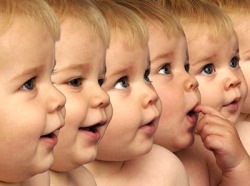The Ethics Of Human Cloning
Human Cloning Will Lead to Lack of Individuality

In normal human reproduction, children receive half of their mother's genes, and half of their father's. In cloning however, a clone's DNA is exactly the same as that of their "parent". Consequently, a cloned child would appear exactly the same as their parent in appearance. Clones will be the same height, have the same facial appearance, possess the same balding patterns, inherit diseases, have the same nature and talents, and may even have the same cause of death, as that of their parent. Born as a copy of their parent, cloned children may feel obligated to be just like their parent. It is a serious concern that most clones will live in the shadow of their parent, and will not develop to become their own individual being. It is unknown whether or not a human clone will possess the traits needed to have true freedom from their parent, or even have the brain function to develop as human beings.
Since clones are replicates of their parent, their genes will be known in advanced. Cloning will allow people to choose a child's genotype. Since people would able to choose their child's genotype, human individuality could be put in danger. The genes some people view as superior will no longer be special, because they will be available to anyone's choosing. According to The President's Council on Bioethics' article, Human Cloning and Human Dignity: An Ethical Inquiry, human cloning may have effects on the "human identity" and "it could distort family relations and effect society as a whole."(pg 2). In a society where people have the choice of their child's genotype, only certain characteristics may be viewed as acceptable. Cloning could result in little diversity and individuality or even a population that is eventually the same.
Since clones are replicates of their parent, their genes will be known in advanced. Cloning will allow people to choose a child's genotype. Since people would able to choose their child's genotype, human individuality could be put in danger. The genes some people view as superior will no longer be special, because they will be available to anyone's choosing. According to The President's Council on Bioethics' article, Human Cloning and Human Dignity: An Ethical Inquiry, human cloning may have effects on the "human identity" and "it could distort family relations and effect society as a whole."(pg 2). In a society where people have the choice of their child's genotype, only certain characteristics may be viewed as acceptable. Cloning could result in little diversity and individuality or even a population that is eventually the same.
